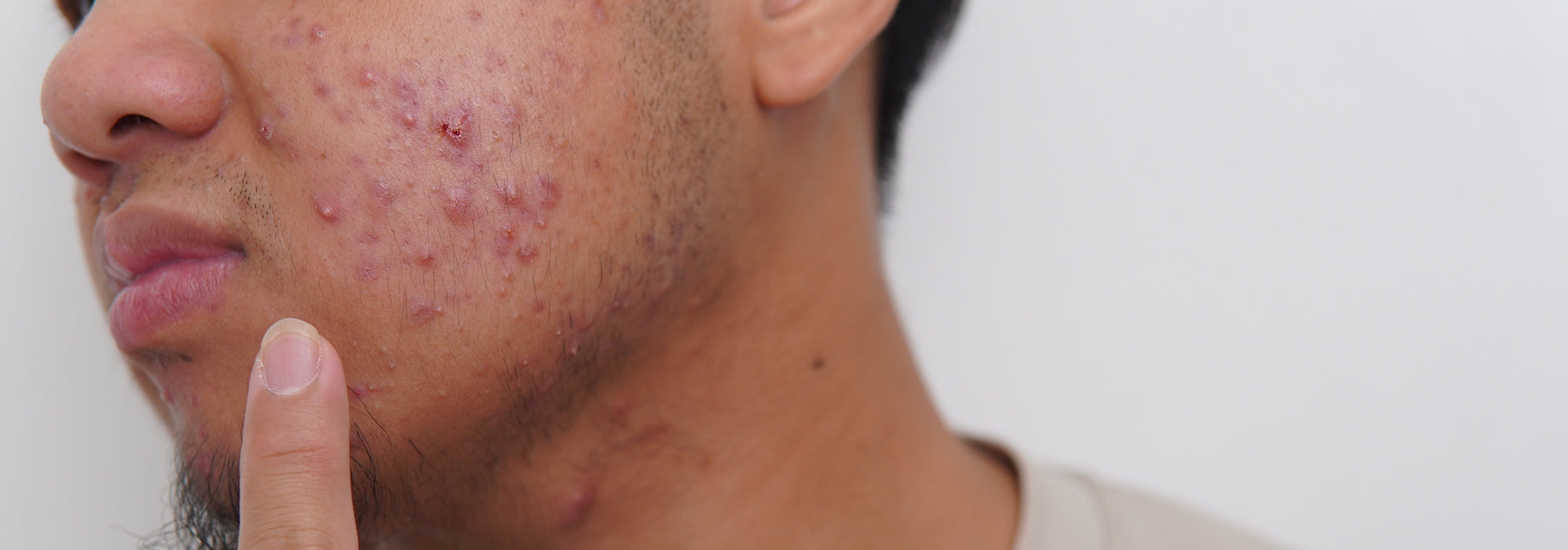Main Causes of Acne
Hormonal Changes
Hormonal fluctuations are one of the primary reasons many people develop acne. During puberty, the body undergoes significant hormonal changes, leading to an increase in androgen levels. Androgens stimulate the sebaceous glands to produce more sebum, an oily substance that can clog pores and lead to the development of acne vulgaris.
Hormonal acne isn’t limited to teenagers; it can also affect young adults and women during menstruation, pregnancy, or menopause. When hormone levels spike, it can trigger acne or make existing acne worse.
Excess Sebum Production
The sebaceous glands, located beneath the surface of the skin, produce sebum to keep the skin hydrated. However, when these glands produce too much sebum, it can clog pores, creating an environment where acne develops. The combination of excess sebum and dead skin cells can block hair follicles, leading to blackheads, whiteheads and more severe acne forms, such as cystic acne.

Bacterial Growth
The bacteria Propionibacterium acnes (P. acnes) naturally resides on the surface of the skin, within the hair follicles. Under normal circumstances, this bacterium is harmless, but when pores become clogged, it can multiply rapidly, causing inflammation and infection. This bacterial growth contributes significantly to the development of cystic acne, one of the most severe forms of acne. Without proper acne treatment, this condition can lead to long-lasting acne scars.Clogged Pores
Clogged pores are a direct result of excess oil, dead skin cells and dirt accumulating on the surface of the skin. When hair follicles become blocked, it creates the perfect environment for acne to flourish. Factors such as poor skincare routines, inadequate cleansing and the use of comedogenic products can all contribute to clogging pores and worsening acne. To prevent acne, it's essential to keep the skin clean and exfoliated regularly.Diet and Lifestyle Factors
While diet alone is not a direct cause of acne, certain foods and lifestyle habits can trigger acne or worsen acne for some individuals. High-glycaemic foods, dairy and foods rich in processed sugars can increase insulin levels, which may, in turn, cause an increase in oil production and clogged pores. Stress, lack of sleep and smoking are also known to exacerbate the condition, leading to more severe acne outbreaks.Genetics
Genetics play a significant role in determining who is more likely to develop acne. If your parents struggled with acne, you might be genetically predisposed to developing acne as well. While you can’t change your genes, understanding your skin type and the types of acne you’re prone to can help you tailor your skincare routine to treat and prevent acne more effectively.

Skincare Routine for Acne-Prone Skin
An effective skincare routine is key to managing acne-prone skin. Here’s a step-by-step guide to help treat severe acne and prevent new breakouts:Step 1: Cleanse
Allmedic Acne Clear Cleanser or Allmedic Active Face & Body Cleanser
Start your routine by cleansing your skin with this gentle yet effective cleanser. It removes excess oil and impurities without stripping the skin, helping to keep your pores clear and reduce the likelihood of acne developing.
Step 2: Exfoliate
Allmedic Acne Clear Scrub or Allmedic Active Exfoliating Scrub
Exfoliate your skin 2-3 times a week with these scrubs to remove dead skin cells and prevent clogged pores. Regular exfoliation helps in keeping the skin’s surface smooth and clear, making it less prone to breakouts.
Step 3: Treat
Allmedic Acne Clear Night Exfoliating Lotion or allmedic Skin Repair Cream
Apply this exfoliating lotion at night to treat acne and prevent future breakouts. It works to clear active breakouts while also helping to prevent new ones from forming, ensuring your skin remains clear.
Step 4: Detoxify
Allmedic Detoxifying Skin Lotion
Use this detoxifying lotion to remove impurities and reduce inflammation, keeping your skin healthy and less likely to trigger acne. Detoxifying your skin regularly can help in preventing acne vulgaris and more severe acne conditions.

Conclusion
Understanding the main causes of acne is the first step in managing and preventing this common skin condition. By addressing the underlying factors such as hormonal changes, excess sebum production and bacterial growth, you can effectively treat and prevent acne from worsening.
Incorporating a consistent skincare routine using products like those from Allmedic can make a significant difference in keeping your skin clear and healthy. Remember, the key to clear skin is not just treating acne but also taking steps to prevent it from developing in the first place.
FAQs
What are the common causes of adult acne?
Adult acne can be caused by various factors, including hormonal changes, stress and lifestyle choices. It’s important to identify the underlying factors that cause acne in adults to effectively manage and prevent breakouts.How is acne diagnosed by a dermatologist?
To diagnose acne, a dermatologist or Skin doctor will examine your skin and review your medical history. They may also consider factors like age, lifestyle and any underlying health conditions.How can acne be treated effectively?
Acne treated with a combination of topical treatments, oral medications and lifestyle changes can yield effective results. It’s also essential to follow a tailored skincare routine for the best outcomes.
This information is not intended to be used for diagnosis or treatment. It is aimed at presenting a perspective only and is not a substitute for a prescription. Anyone experiencing a medical condition should consult their doctor.


